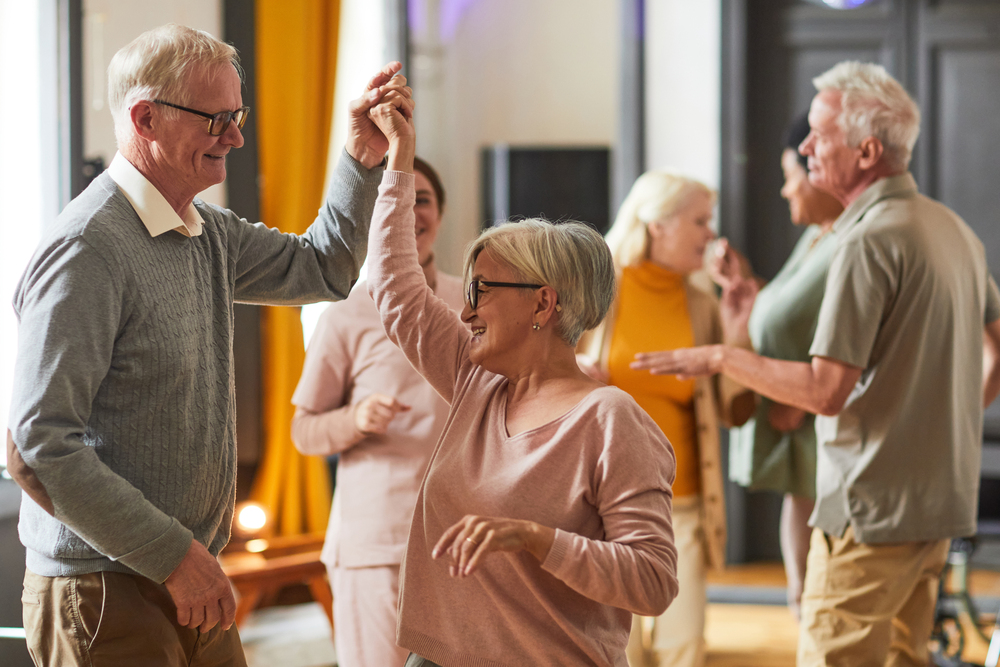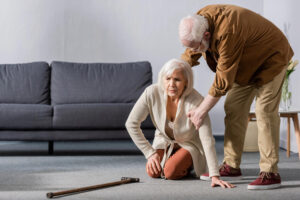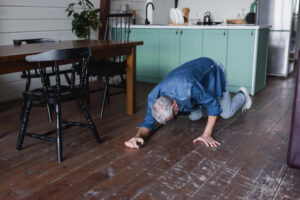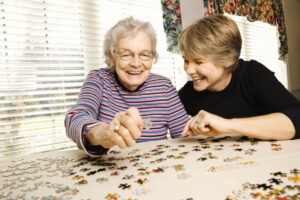Music has long been recognized as a universal language that transcends age, culture, and background. For seniors residing in nursing homes, the importance of music takes on a whole new dimension. Discover many of the benefits of music for seniors in nursing homes, and how it can make a major difference in their quality of life.
The Profound Impact of Music for Seniors and Nursing Home Well-Being

Music is a vital part of life for many people. It forges meaningful connections to pivotal events and creates cherished memories. Research consistently shows that music can promote relaxation, improve productivity, and lower stress levels. These benefits have even been found to have a positive effect on immunity and mental health.
However, for seniors in nursing homes, music offers even greater advantages. Pleasing melodies offer substantial benefits for aging adults, improving physical and mental health, memory retention, and important social connections.
Music has long been recognized as a universal language that transcends age, culture, and background. For seniors residing in nursing homes, the importance of music takes on a whole new dimension. Discover many of the benefits of music for seniors in nursing homes, and how it can make a major difference in their quality of life.
The Profound Impact of Music for Seniors and Nursing Home Well-Being
Music is a vital part of life for many people. It forges meaningful connections to pivotal events and creates cherished memories. Research consistently shows that music can promote relaxation, improve productivity, and lower stress levels. These benefits have even been found to have a positive effect on immunity and mental health.
However, for seniors in nursing homes, music offers even greater advantages. Pleasing melodies offer substantial benefits for aging adults, improving physical and mental health, memory retention, and important social connections.
The Role of Music in the Well-Being of Nursing Home Residents
Below are some of the specific ways that music improves the quality of life for seniors living in nursing homes.
Music Promotes Overall Wellness
For many seniors in nursing homes, the benefits of music are wide-ranging:
- Pain Management: Music can help alleviate pain and discomfort without medication, acting as a natural and side-effect-free way to manage pain.
- Mood Enhancement: Enjoyable music lifts one’s spirits, combating the blues often experienced by nursing home residents.
- Increased Independence: The effects of music can instill a sense of self and encourage nursing home residents to participate more actively in their daily activities.
Music has the power to stimulate feelings of well-being by evoking powerful internal experiences. Engaging with music can enhance a senior’s ability to remember recent events, and may find warmth and meaning in songs that bring back older positive memories.
Music Encourages Physical Activity
One of the most significant benefits of music for seniors in nursing homes is its ability to motivate physical activity. Music can provide the perfect backdrop for exercise routines. whether it’s:
- Walking
- Dancing
- Stretching
- Group exercise
It’s even conducive to lightweight training. The right music plays an important role in encouraging seniors to get more physical activity, which can help maintain independence and restore function lost due to injuries or illnesses.
Nursing homes can leverage the motivational power of music by:
- Creating playlists tailored to different exercise routines
- Organizing music-centered exercise sessions
- Incorporating music into treatments and physical therapy sessions
Seniors of all ages and fitness levels can benefit from an increase in movement, which helps improve muscle strength, flexibility, heart health, bone density and balance. By adding music to physical activities, assisted living professionals can help seniors increase their activity levels in a way that feels enjoyable, at a safe and beneficial pace.
Music Improves Memory and Cognition
Music is incredibly beneficial for the brain. Studies show it activates important pathways linked to different cognitive processes, including:
- Enhanced memory recall
- Increased attention span
- Improved language abilities
- Potential delay in cognitive decline
Experts even note that music can improve the quality of life for those living with dementia, a condition experienced by many nursing home residents.
Music therapy can increase brain chemicals that arouse positive feelings. By evoking powerful memories and emotions, music can provide a sense of comfort and familiarity in what might otherwise be an unfamiliar environment.
Assisted living communities can maximize these benefits by:
- Creating personalized playlists that remind residents of music from their younger years
- Organizing group listening sessions or sing-alongs for familiar songs
- Offering music-based games and activities
Some research even suggests that music can also help prevent or slow the onset of dementia. As such, many nursing homes make music a central part of daily activities, with special emphasis on well-known tunes that evoke connections to long-ago memories.
Music Enhances Social Connections

As some of us age, a variety of health problems can make communication more difficult, potentially leading to feelings of isolation. This social disconnection can increase health risks—and even shorten life spans.
For these particular seniors in nursing homes, music opens up avenues of communication that otherwise may not be available.
Research has demonstrated that listening to music on a regular basis can enhance communication for people with dementia by:
- Improving cognition and language abilities
- Sparking discussions that improve connections with others
- Encouraging social interactions in group settings
Music-related social activities can take different forms, including:
- Singing and dancing
- Learning and playing musical instruments
- Listening to music
- Watching musical performances
These activities turn music for seniors in nursing homes into opportunities to bond with fellow residents, staff members, and visiting family and friends.
Implementing Music Programs for Seniors in Nursing Homes
On a daily basis, seniors in assisted living benefit from music that boosts moods, encourages exercise, discourages isolation, and promotes overall mental and physical health. If you provide care for a senior, consider the following tips from the Alzheimer’s Association for choosing music that improves the quality of life:
- Select music that is enjoyable and familiar.
- Choose songs that are consistent with the mood you want to encourage.
- Opt for music that is suitable for clapping, singing, and dancing along.
- Consider the time of day and the desired effect.
- Be mindful of volume levels, especially for residents with different hearing needs.
A comprehensive music program should consider the different ways music can benefit seniors living in nursing homes. To fully harness the therapeutic benefits of music, consider:
- Working with residents and their families to create playlists and reflect each senior’s musical preferences
- Scheduling regular group activities centered around rotating music selections
- Inviting local musicians or school groups to perform live music for seniors in nursing homes
- Bringing a certified music therapist in to work with residents in small groups
- Using music as a starting point for discussions about residents’ lives
Using Music for Seniors in Nursing Homes
The power of music to enhance the lives of seniors in nursing homes cannot be overstated. Contact us to learn about how, by incorporating a wide range of musical experiences into nursing home life, we create an environment that both cares for the basic needs of seniors and enriches their lives with deep meaning.
Music is a powerful tool with the potential to transport a resident back to happy times and create new joyful memories within their nursing home community. For senior care, music is something that resonates deeply with the human spirit and has the potential to transform the nursing home experience for residents, staff, and families alike.




















